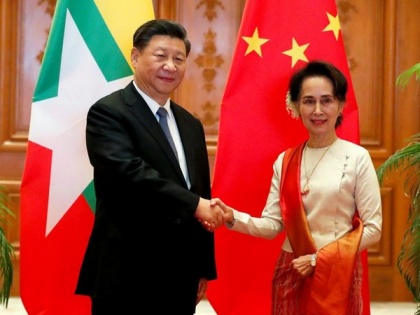Myanmar treading with caution against China-funded Economic Corridor amid concerns over Chinese projects in Pakistan, Sri Lanka
By ANI | Published: August 22, 2020 07:49 PM2020-08-22T19:49:14+5:302020-08-22T20:05:07+5:30
Myanmar is demonstrating caution and resistance to China, which has been attempting to deepen its influence on Naypyitaw through the China Myanmar Economic Corridor (CMEC).

Myanmar treading with caution against China-funded Economic Corridor amid concerns over Chinese projects in Pakistan, Sri Lanka
Myanmar is demonstrating caution and resistance to China, which has been attempting to deepen its influence on Naypyitaw through the China Myanmar Economic Corridor (CMEC).
According to a report in The Irrawaddy, the reason for Myanmar's recent behaviour is Pakistan's experience in China Pakistan Economic Corridor (CPEC).
Myanmar's leadership has kept a sharp eye on Pakistan, writes Yan Naing in The Irrawaddy. Yan Naing is the pseudonym of a regular observer on Myanmar affairs.
Though Chinese President Xi Jinping had hailed CPEC as the flagship project of his Belt and Road Initiative, the situation on the ground was "hardly rosy".
In an investigative report published in 2017, the Pakist daily Dawn unveiled that China was forging a new structural relationship with Pakistan, which would enable Beijing to exercise overwhelming influence on Islamabad.
"The [CPEC] plan envisages a deep and broad-based penetration of most sectors of Pakistan's economy as well as its society by Chinese enterprises and culture," the daily reported in its detailed investigation.
Likewise, Myanmar also draws a lesson from Sri Lanka and Maldives, where China has made efforts to push big infrastructure projects that are deemed to be debt traps.
"The Chinese invested billions of dollars at high-interest rates, and leveraged them to acquire strategic assets, such as the Hambantota port in Sri Lanka on a 99-year lease," Yan writes.
In terms of geography, the Chinese have proposed that the CMEC would take the shape of an "inverted Y".
It would start from China's pivotal Yunnan province, which shares borders with Myanmar, Laos and Vietnam. From Ruili city on the China-Myanmar border, the corridor would head towards Mandalay, Myanmar's former royal capital on the banks of the Irrawaddy River in the northern part of the country. From there, it could extend towards the east and west to Yangon New City and the Kyaukphyu Special Economic Zone, in the western Rakhine province.
China has proposed 38 projects under CMEC and Myanmar so far has approved only nine.
"Since last year senior Myanmar officials said that Myanmar will only implement the projects that can guarantee mutual benefits for both sides. Reading the tea leaves, the Myanmar government led by de facto leader Aung San Suu Kyi is showing signs of standing up to China," he further states
Myanmar continues to suspend the construction of Myitsone Dam. The proposed USD 3.6-billion dam is one of seven hydropower projects planned for the upper reaches of the Irrawaddy River as well as the Mali and N'Mai rivers, at whose confluence the Irrawaddy begins.
"Work on the project started in 2009, but then-President U Thein Sein suspended it in 2011 amid widespread public concern over the dam's social and environmental impacts. The Chinese were humiliated to learn the news of the suspension," Yan notes.
Myanmar government has set up a 20-member commission including the chief minister of Kachin State to review the project, including its environmental and social impacts. The commission has produced two reports to date, but the government has yet to release either.
As of today, the project remains in limbo.
Similarly, there has been no forward movement, so far, on the ambitious China-backed rail project to link Shan State's Muse, on the border with China, with Mandalay. This $9 billion project involves constructing 431 kilometres of new track, which will link up with China's high-speed network in Yunnan.
U Set Aung, the deputy minister of planning and finance, who is also chairman of the Kyaukphyu SEZ Management Committee, has openly warned against falling into the Chinese "debt trap". He has stressed that Chinese projects must-have commercial viability and benefit Myanmar. The minister has successfully negotiated a reduction in the size and cost of the Kyaukphyu project in Rakhine.
Yan says that the situation is also ripe to step up ties with Naypyitaw, to counter China, following a trust-breaking military standoff between New Delhi and Beijing in Ladakh.
"There has been no let up in Japanese investments in Myanmar, but ties between the two countries could acquire a sharper security dimension as political friction between Tokyo and Beijing is flaring once again over their disputed East China sea islands," he writes.
( With inputs from ANI )
Disclaimer: This post has been auto-published from an agency feed without any modifications to the text and has not been reviewed by an editor
Open in app